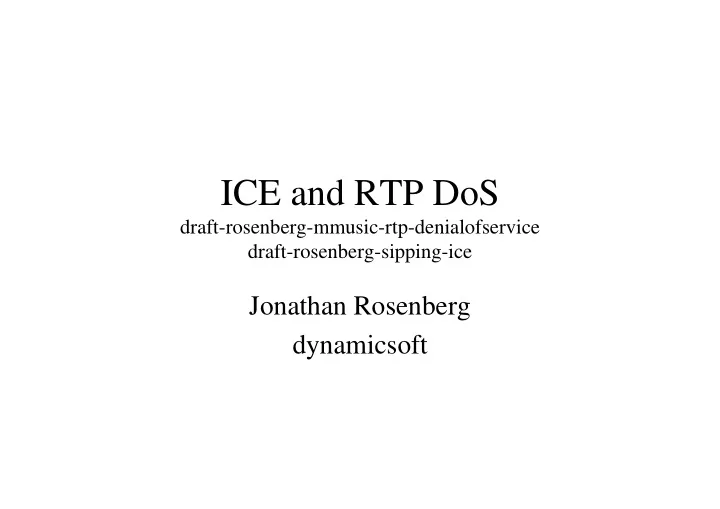

ICE and RTP DoS draft-rosenberg-mmusic-rtp-denialofservice draft-rosenberg-sipping-ice Jonathan Rosenberg dynamicsoft
The DoS Problem • Attacker sends SIP Server INVITE or RTSP RTP SETUP to server Flood INVITE/SETUP • IP for RTP is target With IP of target – Source IP in RTSP – SDP in SIP Client/ Target • Server sends media to Attacker target
Scope of Problem • Easily launched by script kiddies • Nearly infinite amplification – Particularly effective with multimedia servers • All it needs is a server that accepts many simultaneous calls • With RTSP, “send only to RTSP source” limits it a bit – NAT makes it worse – opens the attack to anyone behind your NAT • With SIP, its really bad – no similar checks
Mitigation • Don’t send whats not • Authentication wanted – Can help identify the – Before sending RTP, check sender of the attack that someone is actually – Can’t prevent the listening at the target attack address – Requires a request/response – Many services have mechanism to the RTP weak enrollment, so ports authentication doesn’t – Mechanism must not be help amenable to attacks itself • Web signups – That’s ICE!
Proposal • This security consideration needs to be documented, along with solutions – Part of revision of RFC 2326 – An additional document that updates offer/answer • Further discussion is needed on whether ICE is right for RTSP • Seems right for SIP
ICE
Problem Statement • We still don’t have a good answer for NAT traversal in SIP!! • That is clear from nat-scenarios – Tons of cases – Best solution in each case depends on network topology, business issues, etc. • Lots of components – STUN, TURN, MIDCOM, RSIP, etc. • How can we expect interop or reliability?
Solution: Interactive Connectivity Establishment (ICE) • ICE is a methodology for NAT traversal – Makes use of STUN, TURN, RSIP, MIDCOM – Entirely resident within the clients • ICE explains how to use the other protocols for NAT traversal • ICE Properties – Always will find a means for communicating if one physically exists – Always finds the lowest latency communications path – Always finds the communication path cheapest for the service provider – Does not require any knowledge of topology, NAT types, or anything
Basic ICE Algorithm • Client obtains addresses – Local interfaces – UNSAF protocols – VPNs • Client lists all of them in an offer • Answerer tests connectivity to each of those – Connectivity test uses peer-to-peer STUN • Connectivity test may yield more addresses • Answer provides all its addresses (local interfaces, UNSAF, VPNs + STUN derived addresses) • Offer performs the same connectivity check • Highest priority address is used • May require several iterations
History • Presented at IETF 56 • Revision submitted for IETF 57 • SIPPING agrees they want this, but they recognize that ICE is purely an offer/answer/SDP issue – May be used for RTSP as well • So, the SIPPING group and TSV AD s felt it would best be done in mmusic – Would be amenable to a charter revision to add • SIP usage cases would be done in sipping • Proposal: take ICE as a work item and make it applicable to SIP and RTSP
Recommend
More recommend